Learn how the Bible's multifaceted view on family extends beyond blood to encompass bonds of faith and community, inviting deeper exploration.

Definition of Family in the Bible
In the vast expanse of the Bible, the concept of family stretches wider than the heavens themselves. You'll discover that definitions of family in the sacred texts are as complex and multifaceted as the stars in the sky.
From the creation of the first human family in Genesis to the spiritual kinships formed in the New Testament, the Bible offers insights into both biological ties and bonds forged by faith. Yet, as you explore these ancient narratives, you'll find yourself on the cusp of understanding something even deeper about the nature of relationships and community.
The question then becomes, what does the Bible truly say about the essence of family, and how does this ancient wisdom resonate in today's world?
Key Takeaways
- Biblical family encompasses biological, adopted, and spiritual relationships, valuing love and faith over genetics.
- Marriage in the Bible is a covenantal foundation for society and familial structures.
- Family roles and relationships in scripture guide moral development and societal contributions.
- Spiritual kinship and chosen familial bonds highlight the inclusivity and depth of biblical family definitions.
The Creation of Family

In the biblical narrative, God's establishment of the family unit marks an intentional act of creation, reflecting a profound understanding of human interconnectedness and dependency. This foundational act isn't merely a functional arrangement for procreation or social organization, but a deliberate structure imbued with divine purpose. At its core, the family is designed as a mirror of divine relationships, highlighting the essential nature of authority, love, and mutual support.
You'll find that parental authority within this framework isn't an end in itself but serves a higher purpose. It's a reflection of the divine order and is meant to guide, protect, and nurture in alignment with God's will. This authority is inherently benevolent, aimed at fostering growth, wisdom, and understanding. It's a model that emphasizes stewardship and responsibility over domination and control.
Moreover, the divine purpose behind the family goes beyond mere biological ties. It encompasses the formation of character, the transmission of values, and the cultivation of a sense of belonging and identity. Through this lens, the biblical portrayal of family isn't only foundational for society but is also central to God's plan for human flourishing.
Analyzing the biblical text, you'll observe that the family is tasked with a mission that transcends the immediate family unit. It's about instilling principles that resonate with the broader community's welfare, illustrating how individual families are integral to the fabric of society. Thus, the creation of the family in the Bible reveals a complex, multifaceted design, where parental authority and divine purpose collaborate to fulfill God's intention for humanity.
Family Beyond Bloodlines

While the biblical narrative firmly establishes the family based on biological ties and divine purpose, it also expansively embraces the concept of family beyond mere genetics, highlighting a broader, spiritual kinship. This inclusive view not only enriches the understanding of family within the scriptures but also offers a more comprehensive perspective on relationships that transcend blood relations.
The Bible presents numerous adoption narratives that serve as profound examples of this extended family concept. These stories don't merely recount legal or social processes but delve deeper into the spiritual connections formed between individuals. They illustrate how acts of faith, love, and commitment forge familial bonds as strong as those based on biology.
Moreover, the idea of community parenting, where the upbringing of a child is a collective responsibility, is another significant aspect that the Bible promotes. This approach to child-rearing emphasizes the role of the wider community in nurturing and guiding the younger generation, highlighting the importance of shared values and mutual support.
Key aspects of family beyond bloodlines in the biblical context include:
- Adoption narratives: Stories that underscore the significance of chosen relationships and illustrate the deep bonds formed through adoption.
- Community parenting: The concept that raising children is a communal effort, illustrating the role of the wider community in the upbringing of its members.
- Spiritual kinship: The notion that true family connections aren't limited to genetics but can be formed through shared faith, love, and commitment.
Marriage and Kinship
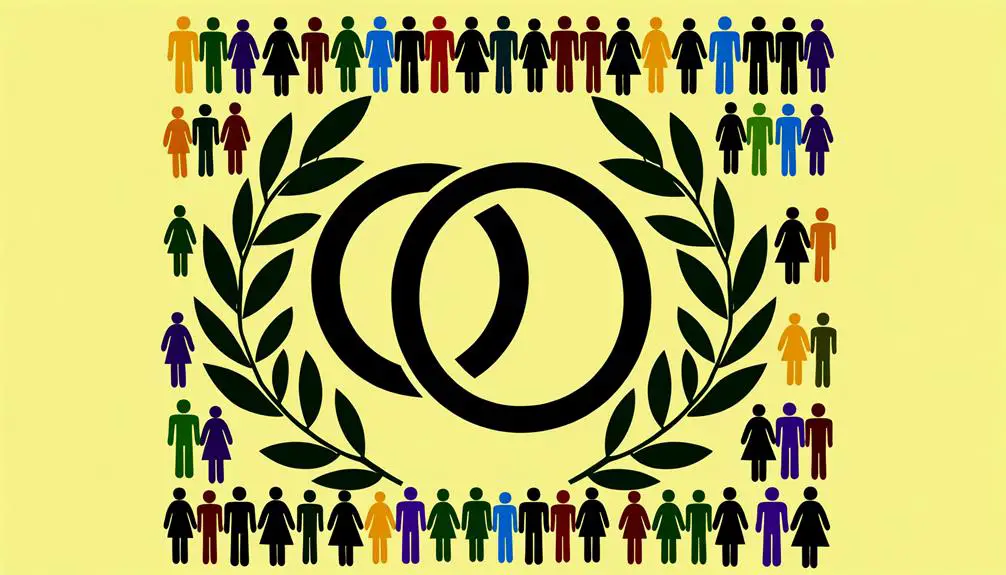
You'll find that the concept of marriage in the Bible isn't just a contract but a covenant, setting a profound foundation for societal structures.
Exploring kinship roles reveals how they intricately weave the fabric of biblical communities, offering insights into responsibilities and privileges.
This examination sheds light on the enduring impact of these ancient frameworks on modern understandings of family and relationships.
Biblical Marriage Foundations
From its earliest accounts, the Bible establishes marriage as a foundational institution for human society, delineating roles and relationships within the family structure. Modern interpretations often explore how biblical directives align or conflict with contemporary values, particularly with evolving divorce perspectives. This analysis reveals a complex interplay between ancient texts and modern life, prompting believers and scholars alike to negotiate their understanding of marriage's sacred bonds.
- Adaptation of Marriage Roles: Insights into how traditional roles have adapted over time.
- Divorce Perspectives: Examination of biblical teachings on divorce in light of current societal norms.
- Modern Interpretations: Exploration of how contemporary views on marriage and family life resonate with, or diverge from, biblical principles.
This scholarly approach helps navigate the multifaceted nature of biblical marriage foundations in a modern context.
Kinship Roles Explained
Exploring the nuanced roles within biblical kinship further broadens our understanding of marriage and family dynamics in scriptural context. Adoption narratives within the Bible offer profound insights into the concept of chosen kinship, challenging traditional notions of biological lineage and emphasizing spiritual and moral bonds over blood ties. These stories highlight the transformative power of love and acceptance, underscoring the inclusivity of God's family.
Meanwhile, sibling rivalry, as depicted in numerous biblical accounts, serves as a lens through which we can examine the complexities of human relationships and the struggle for identity and inheritance within a family structure. This analysis reveals that biblical kinship encompasses a wide range of relational dynamics, each contributing to the rich tapestry of family life as depicted in scripture.
The Role of Children
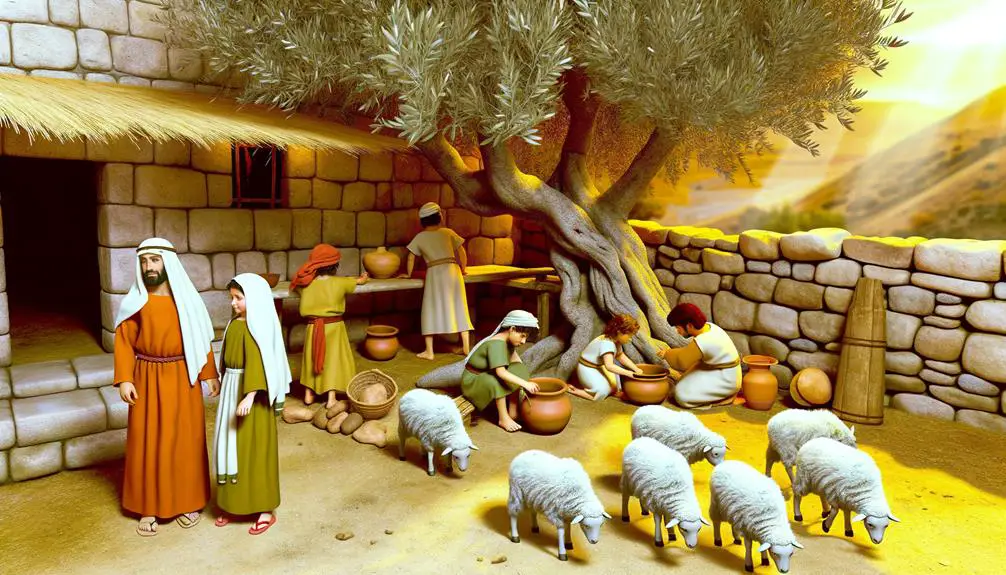
In biblical contexts, children are often seen as gifts from God, bearing significant responsibilities within their families and communities. This view shapes their roles significantly, emphasizing not just the joy they bring but also the duties they hold. Within this framework, the scriptures outline a dual path of parental discipline and a child's obedience, framing these as foundational to the healthy functioning of the family unit and, by extension, society at large.
- Parental Discipline: The Bible advocates for a balanced approach to disciplining children, one that combines correction with love and guidance. This isn't about harsh punishment but nurturing a child towards righteousness and social responsibility.
- Child's Obedience: Obedience isn't merely about submission; it's a form of respect and acknowledgment of the wisdom and protection offered by parents. This obedience is seen as a virtue that contributes to the stability and harmony of the family.
- Contribution to Community: Children are also seen as integral members of their broader communities, with the expectation that they'll contribute positively, reflecting the values and teachings of their faith.
In this light, children's roles transcend the boundaries of the nuclear family, touching upon moral, spiritual, and communal realms. The emphasis on parental discipline and a child's obedience acts as a microcosm of the broader societal order, suggesting that the well-being of the community is deeply intertwined with the upbringing of its youngest members. This perspective underscores the interconnectedness of individual behavior and communal health, highlighting the importance of these roles in the fabric of biblical family life.
Spiritual Brotherhood and Sisterhood
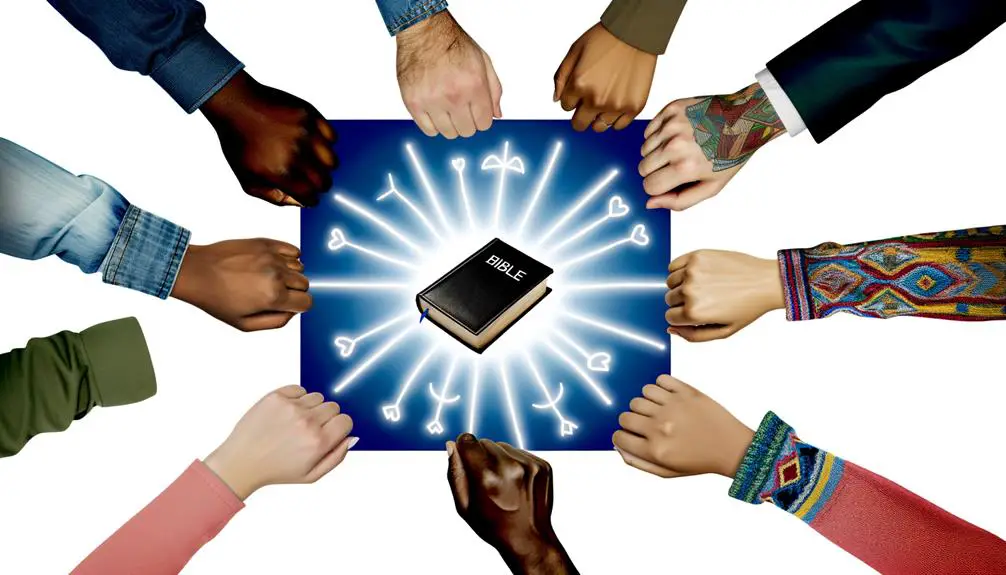
You'll find that the Bible emphasizes spiritual bonds that transcend mere familial ties, highlighting a profound sense of brotherhood and sisterhood among believers.
These relationships, rooted in shared faith and mutual support, reflect a unique fellowship that the scriptures elevate as both vital and sacred.
This unity among believers, fostered through love and common belief, illustrates how spiritual connections can rival, and even surpass, blood relations in their depth and significance.
Biblical Bonds Beyond Blood
The Bible frequently illustrates that spiritual kinship often transcends biological ties, fostering a profound sense of brotherhood and sisterhood among believers. This concept is deeply rooted in:
- Adoption narratives: Biblical stories often depict God's people being chosen or adopted into a spiritual family, emphasizing that divine selection creates lasting bonds beyond bloodlines.
- Covenant relationships: These are pivotal, as they signify solemn agreements between God and His people, underscoring a spiritual kinship that supersedes genetic connections.
- Shared mission and values: Believers are united by a common purpose and ethical framework, which cultivates a sense of belonging and community that mirrors familial bonds.
This spiritual kinship is analytical and reflective of a broader, inclusive understanding of family, where relationships aren't confined to biological lineage but are expanded through faith and shared conviction.
Fellowship in Faith
Delving into the concept of fellowship in faith reveals how spiritual brotherhood and sisterhood forge profound connections among believers, transcending traditional familial ties. This paradigm, rooted deeply in scripture, emphasizes not just a shared belief system, but a collective commitment to embodying the principles of love, service, and sacrifice.
Through community outreach and charitable acts, these spiritual families demonstrate a tangible expression of their faith, impacting not only their immediate circles but also the broader community. This engagement isn't incidental; it's central to the identity of faith-based communities, reflecting a deep understanding that their fellowship extends beyond mere social gathering.
It's an active, living testament to their beliefs, where actions in service to others underscore the profound bond that unites them.
Unity Among Believers
Exploring unity among believers reveals how spiritual brotherhood and sisterhood form the bedrock of faith communities, fostering an environment where shared convictions and mutual support thrive. This unity isn't merely a lofty ideal but manifests in tangible, daily practices that strengthen the fabric of the community:
- Church gatherings serve as a cornerstone, offering a space for communal worship and the exchange of spiritual insights.
- Prayer partnerships deepen interpersonal bonds, allowing members to bear one another's burdens and celebrate victories together.
Engaging in acts of service, believers practice the love they profess, embodying the principles taught by scripture.
Such practices underscore the significance of unity, highlighting how it's both a gift and a responsibility, entrusted to believers to nurture and maintain within their spiritual families.
Genealogies and Ancestry
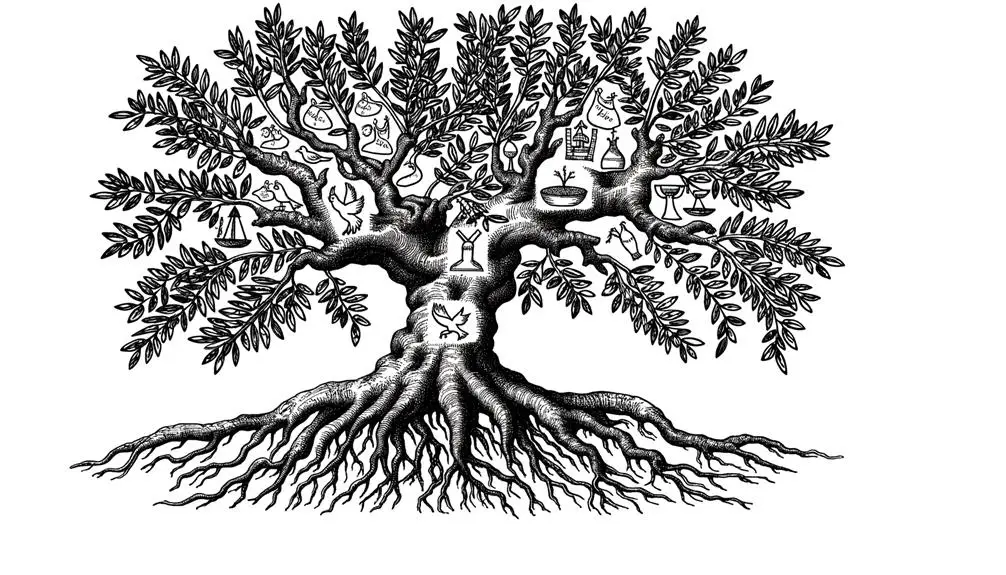
Within the pages of the Bible, genealogies and ancestry not only serve as historical records but also weave a complex narrative that reveals the foundational beliefs and cultural values of its time. You'll find that these lists, often meticulously detailed, aren't simply about who begat whom. They're imbued with profound spiritual and social implications, highlighting the importance of ancestral curses and family blessings. This aspect underscores a belief system where one's fate and standing in the community could be significantly influenced by their lineage.
Delving deeper, you'll notice that genealogies in the Bible do more than trace lineage; they serve as a testament to God's faithfulness across generations. They remind you that promises made to ancestors were kept, demonstrating a divine commitment that transcends time. This continuity reinforces the concept of a covenant between God and families, not just individuals, showcasing how blessings and curses could flow through generations.
Moreover, these ancestral records challenge you to think about identity and belonging in a communal rather than an individualistic sense. They suggest that understanding one's place in a larger story is crucial for personal and collective identity. This perspective is especially relevant in a time when individualism often overshadows communal values.
In analyzing biblical genealogies, you're invited to appreciate the depth of connection between the past and present, where ancestral blessings and curses resonate through the ages. This reflection on ancestry in the Bible reveals a rich tapestry of faith, heritage, and divine interaction, offering insights into the complex relationship between God, families, and their unfolding stories throughout history.
The Prodigal Son: A Family Story

Building on the intricate web of genealogies and the significance of familial bonds in biblical narratives, the parable of the Prodigal Son unfolds a profound story of forgiveness, redemption, and the enduring strength of family ties. This narrative delves into the complexities of human nature, exploring the themes of lost values and the arduous redemption journey back to familial and divine acceptance.
The Prodigal Son's tale begins with a young man who, driven by a desire for independence, demands his inheritance early from his father. This act symbolizes a departure from family traditions and values, setting him on a path of self-discovery and, ultimately, self-destruction. His eventual realization and return signify a powerful message of redemption and the boundless capacity for forgiveness within the family unit.
- Lost values: The son's squandering of his inheritance on frivolous pursuits mirrors our own potential to stray from core values and principles.
- Redemption journey: His return isn't just a physical journey but a metaphorical one, representing the internal struggle and the steps one must take towards self-redemption.
- Enduring strength of family ties: The father's unconditional acceptance of the returning son highlights the unwavering strength and love inherent in familial bonds.
Analyzing the Prodigal Son's story, you encounter a rich tapestry of themes relevant to understanding familial dynamics. This parable serves as a reminder of the transformative power of love and forgiveness within the family, encouraging a reflection on the significance of reconciliation and the enduring nature of family ties.
Families in Christian Community
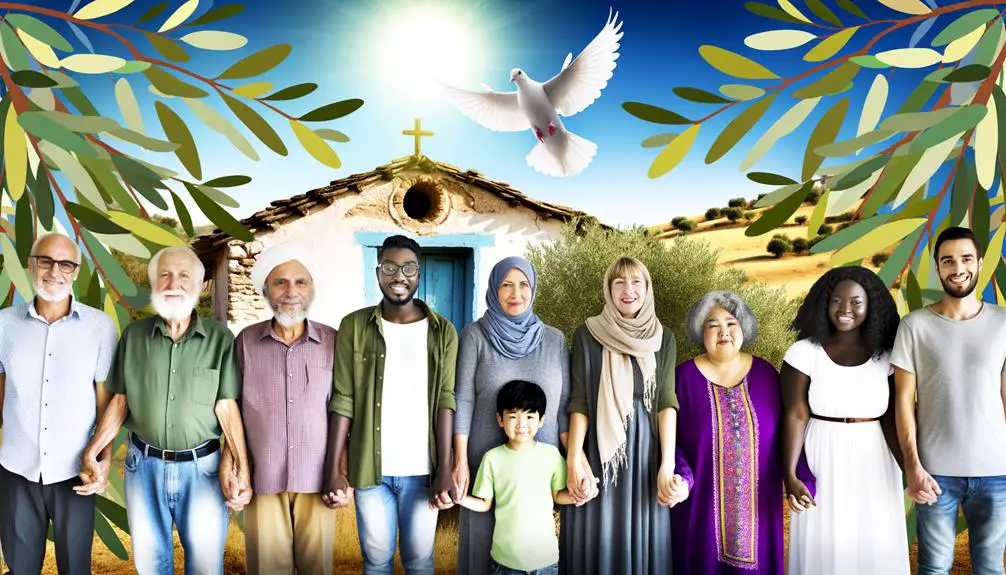
In Christian communities, families stand as the foundational unit, deeply intertwined with the practices and beliefs that shape collective and individual faith journeys. Your participation in this community, guided by the principles of love, service, and faith, directly impacts not just your own spiritual growth but also that of your family and the wider community. Through parental guidance, you're tasked with imparting these core values to your children, ensuring a lineage of faith that strengthens the community's fabric.
Parental guidance in these communities isn't just about teaching; it's about embodying the Christian virtues of love, patience, and humility. You're not just telling your children about Jesus; you're showing them how to live like Him. This hands-on approach to faith development ensures that the principles of Christianity are not just learned but lived.
Community service, another pillar of Christian family life, offers a practical application of Jesus' teachings about love and service to others. Engaging in community service as a family not only benefits those you're helping but also strengthens your family's bond and your collective faith.
Here's a brief overview of the roles and activities that underscore the importance of families in Christian communities:
Role/Activity |
Description |
|---|---|
Parental Guidance |
Parents model and teach Christian values and practices. |
Community Service |
Families participate in service projects, embodying Christian love and compassion. |
Faith Practices |
Families engage in prayer, Bible study, and worship together. |
Support System |
Families provide spiritual and emotional support to each other and the community. |
Through these roles and activities, families in Christian communities exemplify the living testament of faith in action, fostering a nurturing environment where faith can flourish both individually and collectively.
Frequently Asked Questions
How Do Modern Interpretations of Family in the Bible Address the Concept of Same-Sex Couples and Their Families?
You're exploring how modern interpretations address same-sex couples and their families, focusing on legal recognition and cultural acceptance. These interpretations often extend beyond traditional views, advocating for inclusivity and acknowledgment within religious communities.
What Does the Bible Say About the Role and Treatment of Stepchildren and Adopted Children Within a Family?
You're venturing into a landscape as complex as a labyrinth when you examine the Bible's perspective on stepchildren and adopted kids.
It doesn't explicitly detail their roles and treatment but, through a lens of genealogical importance and cultural context, suggests a foundation of love and acceptance.
This ancient text, while rooted in its time, offers insight into the evolving nature of family dynamics, encouraging a broad, inclusive understanding of family connections.
Are There Biblical Guidelines for Resolving Conflicts Within a Family, and if So, What Are Some Specific Examples?
You're seeking biblical guidelines for resolving family conflicts, focusing on conflict resolution strategies and forgiveness practices. The Bible offers numerous insights, emphasizing reconciliation and understanding.
For example, Matthew 18:15-17 outlines steps for resolving disputes privately, then with witnesses, and finally within the church community. Ephesians 4:31-32 champions letting go of bitterness and embracing forgiveness.
These passages provide specific examples of how to approach conflict resolution within a family, advocating for patience, dialogue, and empathy.
How Does the Bible Address the Responsibility of a Family Towards Members With Disabilities or Special Needs?
You're diving into how the Bible approaches family responsibilities towards members with disabilities.
Like threads in a tapestry, inclusive communities and disability theology weave together, offering a blueprint for support and understanding.
The Bible doesn't shy away from these issues but instead prompts families to embrace every member with compassion and dignity.
Analyzing these texts, you'll find a rich foundation for fostering environments where everyone's needs are acknowledged and met, reflecting a deeper, scholarly insight.
In What Ways Does the Bible Guide Families in Dealing With Grief and Loss, Especially the Loss of a Family Member?
When you're navigating grief and loss, the Bible offers profound guidance. It emphasizes the importance of grief rituals and providing emotional support to one another.
These practices aren't just acts of remembrance but pivotal in healing. By engaging in communal mourning and comforting each other, you embody the biblical teachings on empathy and resilience.
This approach not only honors the departed but also fosters a stronger, more compassionate family bond.
Conclusion
In your exploratory journey through biblical definitions of family, you've uncovered layers beyond mere bloodlines.
The intricate weaving of marriage, kinship, and spiritual connections paints a vivid tapestry of belonging.
But here's the twist: the biblical narrative continually challenges and expands our understanding of family.
As you ponder the role of children, the embrace of genealogies, and the profound lessons from stories like the Prodigal Son, remember, the essence of family in the Bible is a puzzle, ever-evolving, beckoning deeper insight.



Sign up